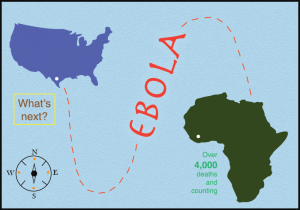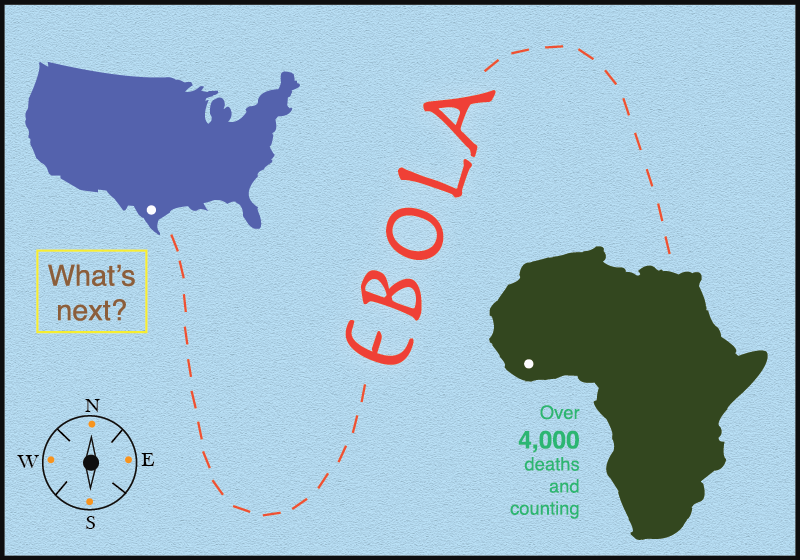Ebola virus reminiscent of AIDS epidemic

Thomas Eric Duncan, 42, died from Ebola Oct. 8 at Dallas’ Texas Health Presbyterian Hospital. Two nurses, Nina Pham, 26, and Amber Joy Vinson, 29, who were responsible for Duncan’s care, have since contracted the disease.
It is believed that Duncan contracted the disease while carrying his pregnant neighbor, who was infected with Ebola at the time, to a hospital in Liberia. Pham and Vinson tested positive for the virus after having repeated contact with Duncan while he was in isolation at the Texas hospital.
Pham and Vinson both wore protective gear including a gown, gloves, a mask and a shield while working in Duncan’s care, but health officials are questioning whether the nurses contracted the virus because a lax protocol was in place.
More than half of the recent Ebola infections have occurred in Liberia. Other countries experiencing outbreaks include Guinea, Sierra Leone and Nigeria. The World Health Organization (WHO) reports that there have been 8,900 confirmed cases of Ebola and 4,447 deaths to date. Health experts are calling this the worst Ebola outbreak in the history of the disease and reporting that the number of cases is doubling every three weeks. Ebola is contracted through direct contact with infected bodily fluids, most commonly through human-to-human contact, but also through contact with external fluids in which the virus still lives.
Dr. C.J. Peters an adjunct with UTMB specializing in infectious diseases worked with the CDC to research the transmission of Ebola among humans. Peters is questioning whether or not Ebola can be transmitted through the air. Attempts to contact UTMB specialists went unanswered because of the high volume of demands.
“The patterns suggest that most, if not all, of the infections are due to direct contact with fluids,” Peters said in an Oct. 12 article reported in The Dallas Morning News. “However, I cannot exclude, based on the evidence that we had, a minority might be due to small particle aerosols.”
WHO reports healthcare workers, caregivers and close family and friends of infected Ebola individuals are at the greatest risk of contracting the virus. The incubation period is 21 days and the virus is not contagious until symptoms are present.
As with most viruses and diseases, early detection of Ebola can be life saving. The first symptoms of Ebola are usually fever, fatigue, muscle pain, headache and sore throat. Vomiting, diarrhea, rash, symptoms of impaired kidney and liver function, and in some cases, both internal and external bleeding can follow as the virus worsens in the human body.
“In public health, we are always concerned with any infectious disease,” said Kurt Koopmann, public health information officer with Galveston County Health District. “Our role is to prevent spread and our interest is in protective measures people can take. Stay aware using reliable sources such as a local public health department.
Canada’s National Microbiology Laboratory developed an experimental vaccine called VSV-EBOV. It is awaiting a negotiable final agreement and a final signature. Public Health Agency of Canada will ship the vaccine to WHO headquarters in Geneva next week. Clinical trials will begin soon to determine if the vaccine is safe and how much is needed to prevent the virus.
UTMB in Galveston is working with an Ebola vaccine and treatments for the virus. The research was $26 million National Institutes of Health grant awarded collaboratively with Profectus BioSciences, Tekmira Pharmaceuticals Corp. and the Vanderbilt University Medical Center.
“Pham’s infection means the U.S. has to rethink care procedures,” said Thomas Frieden, CDC director, during a live Yahoo press conference on Oct. 13.
The CDC works with health departments and laboratories in the U.S. to ensure that each state can test and quickly respond to Ebola. Currently the CDC is working with hospitals and health care workers on how to isolate patients and protect themselves from the virus. Homeland Security is working on protective screening to defend against allowing diseases to enter the country, including Ebola.
The screening involves isolating and referring passengers with symptoms to medical personnel, issuing “do not board” orders, providing education to airlines, posting notices, giving a health notice called a care sheet to travelers entering the U.S. from affected countries and retaining the right to suspend entry into the United States when protecting public health.
President Barack Obama is sending thousands of troops to West Africa. Three thousand troops will be sent to Liberia’s capital, Monorovia. The troops will be responsible for the transportation of supplies, personnel, constructing health care facilities, setting up a training facility and training 500 health care workers each week.
“An already very weak public health system is near collapse in these West African countries,” Obama said. “Patients are being turned away and people are literally dying in the streets. Here’s the hard truth: in West Africa, Ebola is now an epidemic of the likes we have not seen before. It’s spiraling out of control, it is getting worse, it’s spreading faster and exponentially.”
At a World Bank and International Monetary Fund meeting in Washington, D.C., Frieden compared the Ebola epidemic to the AIDS outbreak, which also started in Africa.
“In the 30 years I’ve been working in public health, the only thing like this has been AIDS,” Frieden said. “And we have to work now so that this is not the world’s next AIDS.”
RELATED ARTICLES AND SITES OF INTERESTS
http://www.utmb.edu/newsroom/article9738.aspx
http://voanews.com/content/us-sending-troops-to-liberia-expanded-ebola-effort/2451118.html


[…] Ebola continues to make headlines, both positive and negative. There are otherwise rational people who have let fear consume them, effectively moving them to the irrational classification. These are factual statistics. The Signal’s in-depth coverage on Ebola appeared in the Oct. 20 issue. […]